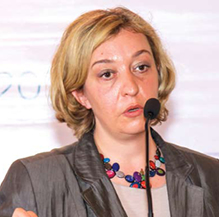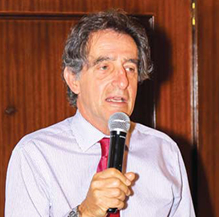Kenya Fights to Wrestle Back EU MarketHorticultural exports are set for an additional standard from next month in a new development by the country to
Category: Featured Articles July – August 2017
A New Flight to UKA new flight from Kenya bringing fresh vegetables and flowers to major UK suppliers has landed at Doncaster Sheffield Airport. A
Frank Ammerlaan: ‘ Why did you decide to go to Ethiopia? “After we’d completed our studies in Business Administration and Plant Sciences respectively, my brother
 A code of practice is a set of written rules which explains how people working in a particular profession/ sector should behave. Kenya has developed the KS1758 Code of Practice for Horticulture Industry: Part 1 deals with Floriculture, and Part 2 deals with Fruits and Vegetables, in line with international standards.
A code of practice is a set of written rules which explains how people working in a particular profession/ sector should behave. Kenya has developed the KS1758 Code of Practice for Horticulture Industry: Part 1 deals with Floriculture, and Part 2 deals with Fruits and Vegetables, in line with international standards.
Recently, the fresh produce exporters of Kenya (FPEAK) held a successful Industry which attracted many stakeholders, including growers, suppliers, stakeholders, government agencies, and development agencies, among others. Speaking uring the conference Mr. Andrew Edewa of Compliance Kenya Ltd. took participants through the soon to be mandatory for exporters and producers to comply with KS1758 as a basic standard.
But then, why do organizations, industries and professions come up with the codes of conduct and practice? Are they really necessary?
Well, the horticulture industry in Kenya in conjunction with the government too, have developed their own code of practice to guide the players in the industry.
 Osmosis is the passing of a liquid through a membrane from a lesser concentration to a greater concentration. Eventually, both liquids would be of equal concentrations. Figure 1, page 48, demonstrates how this reaction takes place. A good example of osmosis is how plants uptake water.
Osmosis is the passing of a liquid through a membrane from a lesser concentration to a greater concentration. Eventually, both liquids would be of equal concentrations. Figure 1, page 48, demonstrates how this reaction takes place. A good example of osmosis is how plants uptake water.
Reverse osmosis (RO) puts pressure on the greater concentrated liquid and forces it through the membrane to the lesser-concentrated liquid, hence the term, reverse osmosis. The membrane traps particles and impurities down to 0.0009 micron, and the effluent or permeate water is very clean and free from impurities. Figure 1 demonstrates how this works. So at its most basic level, reverse osmosis filters impurities from a liquid, namely water.
By starting with water that is free from impurities and minerals, RO water can help make growing more calculable, since the water quality is constant. Nutrients can be better controlled without having to worry about what is in the water source at the beginning of the irrigation process. Contaminants in the water source, such as iron, manganese, calcium, magnesium and chlorine, can react with the nutrients and cause problems with fertilizer mix.
Sylvie Mamias from Union Fleurs told the conference that her organization is involved in lobbying and advocacy on behalf of flower exporters, especially into the
 Mr. Charles Ongwae from the Kenya Bureau of Standards (KEBS) informed the conference that the role of Kenya Bureau of Standards is to develop standards in commerce and industry and in that regard; KEBS has worked with Kenya Flower Council (KFC), Fresh Producer Exporters Association of Kenya (FPEAK) and other key stakeholders to revise KS1758. He encouraged all producers to implement standards to help them in planning, to improve their operational efficiencies and for cutting down costs. He said KEBS works with flower producers to protect the consumer from exposure to certain chemicals which might be dangerous to their health. He encouraged the producers to embrace KS1758 in order to become more effective and efficient in their businesses.
Mr. Charles Ongwae from the Kenya Bureau of Standards (KEBS) informed the conference that the role of Kenya Bureau of Standards is to develop standards in commerce and industry and in that regard; KEBS has worked with Kenya Flower Council (KFC), Fresh Producer Exporters Association of Kenya (FPEAK) and other key stakeholders to revise KS1758. He encouraged all producers to implement standards to help them in planning, to improve their operational efficiencies and for cutting down costs. He said KEBS works with flower producers to protect the consumer from exposure to certain chemicals which might be dangerous to their health. He encouraged the producers to embrace KS1758 in order to become more effective and efficient in their businesses.
Mr. James Wahome from the Kenya Plant and Health Inspectorate Service (KEPHIS) told the conference that all standards applied in the country are found in Cap 319 of the Agricultural Export Act of the Kenyan Laws. He reminded participants that different countries have different laws that govern the import of goods into their countries. He urged the sector players to always consult with KEPHIS in order to keep abreast with the standards and the requirements that are necessary. He spoke of challenges that exporters are likely to encounter like interceptions in the international market, and inconsistencies in rules which keep changing, especially in the EU market. He said that market access is a dynamic function that also keeps changing with changes in technology.
Ruth Vaughan of Crop Nutrition Laboratory Services (CNLS) made the case for identifying the root cause of production deficit, and prescribing corrective actions so as
Producers should seek to ensure that their activities have at best a neutral impact on the environment and should preferably contribute to an improvement.
 The Kenya Flower Council held a conference themed: Floriculture: Caring for People and Nature on 6th June 2017, at Mayfair Hotel in Nairobi. The meeting brought together players in the flower industry and stakeholders from government agencies and the civil society, both local and international. The conference was called to address the challenges in the industry and to review current interventions that could contribute to sustainability in the flower industry. It looked at the aspirations of sustainability at both the global and local level, at the guidelines that the industry has adopted the company standards in place and at initiatives that the industry has developed in partnership with other stakeholders. The forum came up with recommendations to that members could adopt to help them run their businesses successfully.
The Kenya Flower Council held a conference themed: Floriculture: Caring for People and Nature on 6th June 2017, at Mayfair Hotel in Nairobi. The meeting brought together players in the flower industry and stakeholders from government agencies and the civil society, both local and international. The conference was called to address the challenges in the industry and to review current interventions that could contribute to sustainability in the flower industry. It looked at the aspirations of sustainability at both the global and local level, at the guidelines that the industry has adopted the company standards in place and at initiatives that the industry has developed in partnership with other stakeholders. The forum came up with recommendations to that members could adopt to help them run their businesses successfully.
Mr. Richard Fox, the Chairman of Kenya Flower Council (KFC) said that sustainable practice in the flower sector is much more than growing but also encompasses other issues like governance, regulation, logistics, human capital, marketing and distribution.
Sustainability is as much about a mind-set that considersthe future impact of the daily decisions we make in our businesses as it is about supporting and undertaking projects that contribute to enhance our natural and social environment.
 Tell us about Richard Fox
Tell us about Richard Fox
Richard Fox is the Chairman Kenya Flower Council &Sustainability Director for Finlays Horticulture Kenya Ltd. For the past 25 years he has been extensively involved in the Kenyan horticultural sector, and has played a leading role in the promotion of socially and environmentally sustainable business practises in the industry.
In 2011, he was appointed Chairman of Imarisha Naivasha, a multi-stakeholder forum set up by the Kenya Government to oversee a coordinated landscape approach to long term sustainable development in the Naivasha basin, the hub of Kenya’s floriculture industry. Richard is a Fellow of the Institution of Civil Engineers, a Fellow of the Institution of Engineers of Kenya and a Fellow of the Chartered Institute of Arbitrators. He is currently Chairman of the Kenya Flower Council and Lake Naivasha Growers Group and a trustee of Imarisha Naivasha. Chairman Kenya Flower Council
